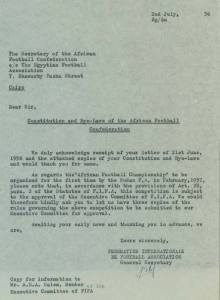
The 2015 African Nations Cup begins on January 17 in Equatorial Guinea. The oil-rich dictatorship, a former Spanish colony with a population of 736,000, agreed to host the tournament on short notice after Morocco pulled out due to fears related to the Ebola outbreak in West Africa.
Africa’s most important tournament is organized by the Confederation of African Football (CAF), a trailblazing pan-Africanist institution born at the dawn of the era of decolonization. Joining the world body, as I’ve written elsewhere, was an honorable, quick, and inexpensive way for newly independent nations to assert their full membership in the international community.
CAF took tangible shape at the 1956 FIFA Congress in Lisbon. There, delegates from Egypt, Sudan, and South Africa convened to draft a constitution and by-laws. The men also decided to organize a continental championship. Ethiopia was also involved in the discussions, but Yidnecatchew Tessema was unable to travel to Lisbon. The African proposal was later sent to FIFA for review and approval (see image at left).
On February 8, 1957, football officials from Sudan, Egypt, Ethiopia, and South Africa convened at Khartoum’s Grand Hotel to formally launch CAF. Fred Fell, a white man representing apartheid South Africa, was invited because his country was a member of FIFA and the Africans did not wish to be perceived as undiplomatic. In the meantime, the white South African football association gingerly debated the composition of the national team. However, the authorities Pretoria opposed a mixed selection and the white football establishment did not challenge the policy.
There are conflicting accounts about what happened next. CAF officials stated that they promptly excluded South Africa in a show of unequivocal pan-African solidarity. Fell and white South African football put forward a different story: they claimed they withdrew the team prior to any sanctions due to the team’s impending tour to Europe as well as security concerns linked to the ongoing Suez Crisis. Unfortunately, the minutes of the meeting at CAF were later destroyed in a fire so we may never know the exact truth of the matter. What is certain is that the South African issue did not disappear. To the contrary, the struggle against apartheid in football would become a powerful bond that united CAF and nearly all African nations for three decades.
South Africa’s absence in 1957 meant that only three teams, comprised of amateurs, participated in the inaugural African Nations Cup. Ethiopia, which had been drawn to play against South Africa, received a bye into the final. Egypt defeated hosts Sudan 2–1 and then dispatched Ethiopia 4–0 in the final watched by a crowd of 30,000 at the Stade Municipal. All four goals were scored by striker Mohammed Diab El-Attar “Ad Diba.” “Those were unforgettable matches,” Ad Diba recalled in an interview in 2001. “The success of this championship and its popularity amongst the Sudanese encouraged the African federation to organize a tournament on a biennial basis and to be played in a different country each time,” he said. Ad Diba made history again eleven years later in Addis Ababa, when he refereed the Afcon final between Congo (DRC) and Ghana (see video).
In those early days, CAF brought to life Kwame Nkrumah’s dream of a United States of Africa. At the same time, football provided a rare form of national culture, unity, and pride in postcolonial Africa.
Today, the African Nations Cup has transformed itself into a globalized commercial event with multinational corporate sponsors, matches on satellite television and online, many European coaches, and most players on the sixteen squads employed by European clubs. It is a far cry from 1957. And yet an alluring contradiction has endured: the Afcon showcases Pan-African solidarity while triggering 90-minute nationalism.